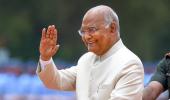Former Chief Election Commissioner T S Krishnamurthy said on Friday that holding of simultaneous Lok Sabha and state assembly polls is desirable and it has many advantages -- such as reducing election expenditure -- but practically there are a lot of challenges to be met.

"It's good to consider, examine the possibility," he told PTI by telephone when contacted for a comment on the government constituting a committee headed by former President Ram Nath Kovind to explore the feasibility of 'One Nation, One Election'.
According to him, there are advantages and disadvantages of holding the polls together.
"There are many advantages (of simultaneous elections) in the sense you will not be wasting so much time in campaigning and all that. Probably election expenditure will also come down," Krishnamurthy said, adding that it's better to save a lot of money and time by holding simultaneous elections.
He pointed out that people have voted differently even though state polls were conducted along with parliamentary elections in the past in some states. There is enough evidence to indicate that the voters vote differently in the state elections and Parliamentary elections even if they are held together, Krishnamurthy added.
Holding of simultaneous elections is theoretically very attractive, but practically there are a lot of challenges to be met. It's desirable if it can be brought about, he said, but added that it's not going to be easy.
Asked if building political consensus on simultaneous polls is going to be challenging, Krishnamurthy said: "Absolutely. It will be challenging; there is no doubt about that".
He said the Law Commission has gone into the issues of simultaneous elections and the Standing Committee of Parliament has also suggested bunching of elections, if possible.
"Bunching of elections is certainly possible in the sense all state elections to be held in one year can be bunched. That at least will reduce the tension of having too many elections in a year. That may be step one for going for simultaneous elections," Krishnamurthy said.
He also said state elections should be conducted on a single day, barring border states, instead of three or four-phased ones.
In his opinion, the most important change that is required to usher in the era of simultaneous elections is a constitutional amendment.
"Because as of now it's based on the Westminster style so that a government can be voted out of office anytime. That has to be changed. How can it be changed ? You can say a vote of no confidence can be brought about but it has to be with a condition that a new government should take place and a new leader has to be voted into office by Parliament which means it will ensure a fixed term of the House. If that is thought about then it is possible to go ahead and conduct (simultaneous) elections".
Then, he said, there are administrative issues about conducting simultaneous elections. That requires a lot of financial outlays, enough armed forces and manpower to conduct the elections but these are issues which are surmountable. But the constitutional issue is the most important challenge. Unless that is addressed and quickly implemented, it will take quite some time (for holding simultaneous elections)".











 © 2025
© 2025